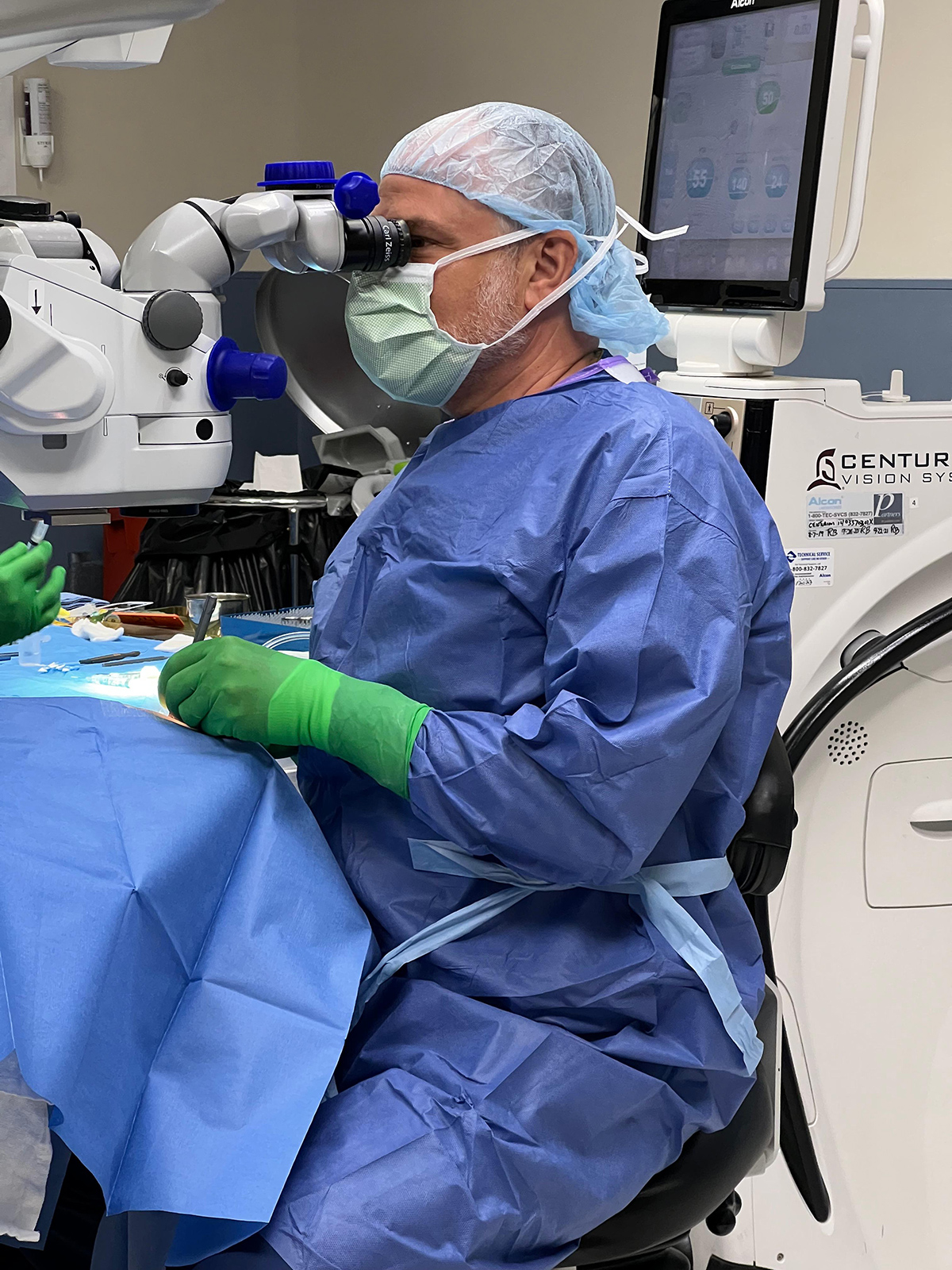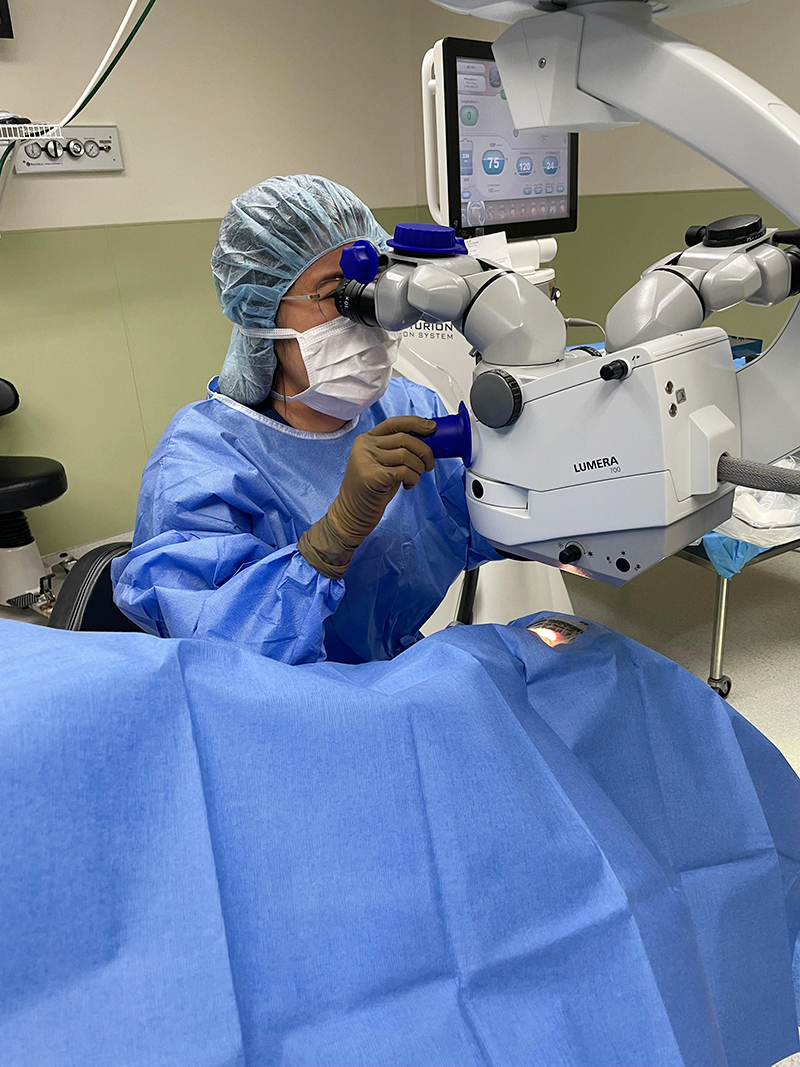
A cataract occurs when the natural lens in the eye becomes cloudy, impairing vision. Before developing cataracts, the natural lens is transparent. As you develop cataracts, it may feel like you're looking through a foggy or dirty window. Often glare at night becomes noticeable.
The clouding and yellowing of the lens are caused by an irregular buildup of proteins in the lens. Over time this process impacts your ability to see clearly. Because cataracts can take several years to develop, you may not realize you have them initially.
You may not experience any visual symptoms for some time while the cataract is still mild. As the cataract matures, your vision will begin to become less sharp and you likely will begin to have symptoms – blurred vision, glare driving at night, needing more light to read, and not being able to get sharp vision with new glasses. The most common reason cataracts develop is aging, but cataracts can also occur for other reasons like injury, taking certain medication, congenital, prior eye surgery, or radiation exposure.

If you have a cataract, you may experience symptoms like:
If these symptoms sound familiar, contact us to be evaluated. These symptoms are not exclusive to cataracts, so you should have an eye exam to determine their cause. If it is cataracts, Dr. Ko or Dr. Putnoi at Putnoi Eyecare will monitor their progression.

If you have cataracts, the only way to treat them is by undergoing Cataract surgery. Cataract surgery is mainly done at an eye-specific outpatient surgery center. Dr. Ko and Dr. Putnoi mainly operate at Surgisite Boston in Waltham but also maintain surgical privileges at Massachusetts Eye and Ear Infirmary.
At the time of surgery, the natural lens is removed and it is replaced with an artificial lens called an intraocular lens or IOL.
Removing the natural lens treats the cataract and helps you see clearly again. The new intraocular lens is tailored specifically to your eye and can often not only allow you to see clearly but often with being much less reliant on the need for glasses.
Most cataract surgery is done with mild IV sedation with eyedrops to keep your eye pain-free during the surgery. In most cases, you are at the surgery center for 2-3 hours from pre-op to post-op. You will go home with a plastic shield covering the eye.

The laser will treat small amounts of astigmatism using a limbal relaxing incision, as well as pretreat the lens to set up the surgery to be as reproducible and predictable as possible. Dr. Ko and Dr. Putnoi will review your options during your consultation.
Cataract surgery can be done manually or with laser-assisted cataract surgery. In manual cataract surgery, Dr. Ko or Dr. Putnoi do all the steps of the surgery by hand. Now with laser-assisted cataract surgery, the initial steps of the surgery are performed by a precision-guided Femtosecond laser.
ORA (intraoperative aberrometry) is an additional way of measuring the power of the eye to help refine the refractive power of the new IOL. These measurements are done during surgery once the cataract is removed. In some cases, these extra measurements may be utilized to refine IOL selection during surgery, ensuring better visual outcomes.

Patients who love visual freedom from glasses and contact lenses but may not qualify for LASIK can choose to undergo Clear Lens Exchange. Clear Lens Exchange is a procedure virtually identical to cataract surgery, except you don't have to have cataracts developing yet.
During Clear Lens Exchange, your natural lens will be removed and replaced with an intraocular lens. At Putnoi Eyecare, you can choose from any of our intraocular lens options when you have Clear Lens Exchange, so you're sure to choose one that's best for your visual needs and lifestyle goals.
Replacing the natural lens with an intraocular lens is a permanent option for refocusing the light to minimize glasses dependency as you age. After Clear Lens Exchange, you'll have crisp, clear vision and won't have to worry about your vision worsening from cataracts as you age. Generally, once this surgery is completed, the refractive state of your eyes (need for glasses) is locked in and minimally changes. It does not mean though it precludes you from other future eye diseases that could cause vision changes (macular degeneration, glaucoma). For some patients, clear lens extraction has been an excellent choice to minimize glasses dependence at a younger age than when cataracts typically develop. If you are interested in evaluation, please contact the office.
The day you've had cataract surgery, your vision will be unstable. In most instances, you will go home with a plastic shield covering the eye. You may see some things clearly, or it may be very blurry. It can be anywhere for the first 24 hours. You'll need a friend or family member to drive you home. Once home, you can relax.
Do not bend over or lift heavy objects to avoid putting pressure on your eyes. Avoid touching or rubbing the surgical eye. For the first 24 hours, your eye may feel scratchy or feel like there is a foreign body rubbing. You are not feeling the lens –that is placed inside the eye. Usually, Tylenol or prescribed drops will help ease any irritation or discomfort.
Putnoi Eyecare is constantly updating its surgical protocols. We are currently implementing a dropless surgery for some patients postoperatively. If you are a candidate for this, you will not need to take post-op eye drops. However, if you are prescribed drops, it is important to comply with the regimen so that we can ensure you get the best surgical result possible.
At Putnoi Eyecare, you will be seen in the office within 24 hours of your surgery. Please bring your drops to this appointment (if taking them). These appointments allow us to monitor your progress and ensure you're healing properly. You should begin seeing an improvement in your vision after only a few days of having cataract surgery, but it may take a few weeks before your vision is entirely stable.
Thanks to a quick recovery, you'll be back to what you love and enjoying it with clearer vision after cataract surgery.

During your cataract consultation, the entire team at Putnoi Eyecare is committed to providing you with the information you need to make an informed decision about your surgical and lens choices. Our staff will provide you with informational videos. You will then have extensive state-of-the-art testing on your eyes. Dr. Ko and Dr. Putnoi will review the various tests and discuss with you the options so that you understand how to proceed with your choices that meet your lifestyle needs and goals following cataract surgery so that they can match you with the right lens.
Do you need a cataract consultation? Schedule one at Putnoi Eyecare in Wellesley Hills and Waltham, MA, now.